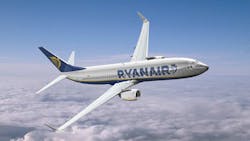Ryanair Holdings Plc Chief Executive Officer Michael O’Leary harangued Boeing Co. over the grounding of the 737 Max jet, saying he’s concerned the Irish carrier will receive zero planes by summer 2020.
Ryanair, Boeing’s biggest European customer for the Max, has already slashed its estimate for the number of aircraft likely to be available for next year’s peak season. O’Leary warned Monday that even the revised figure is at risk if the manufacturer fails to get its act together soon.
Michael O'Leary, chief executive officer of Ryanair Holdings Plc, pauses during a Bloomberg Television interview following a news conference in London, U.K., on Wednesday, Sept. 12, 2018. O'Leary told the news conference that he won't "roll over" in the face of unreasonable demands, while pledging to work to avoid walkouts wherever possible.
“We were originally expecting 58 aircraft for the summer of 2020, that’s now 30 at best. It may well move to 20, it could move to 10 and it could well move to zero,” O’Leary said on a call with analysts after reporting earnings. Boeing needs to put its fixes for the Max before regulators “pretty quickly,” he said.
Ryanair had been due to receive the first Max of 135 on order in April, before the model was grounded worldwide after two fatal crashes in five months killed 346 people. While Boeing is striving to get the jet back into service this year, a slippage into January could put back delivery of a higher-capacity variant scheduled to make its debut with the discount carrier to March, O’Leary said.
The CEO added that Boeing’s guidance as of Friday is that it will submit software fixes for the Max to regulators in October, an update that appears to be at odds with a September target given by the U.S. company last Wednesday. A Boeing spokesman said he couldn’t immediately comment on the matter.
Southwest Airlines Co. said last week it had removed the Max from its planned schedules until Jan. 5, with CEO Gary Kelly saying the idling of 34 planes already delivered meant the U.S. carrier was “spilling traffic and leaving money on the table.”
By Benjamin Katz and Simon Foy
About the Author
Bloomberg
Licensed content from Bloomberg, copyright 2016.
